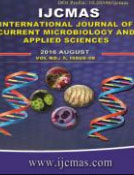


 National Academy of Agricultural Sciences (NAAS)
National Academy of Agricultural Sciences (NAAS)

|
PRINT ISSN : 2319-7692
Online ISSN : 2319-7706 Issues : 12 per year Publisher : Excellent Publishers Email : editorijcmas@gmail.com / submit@ijcmas.com Editor-in-chief: Dr.M.Prakash Index Copernicus ICV 2018: 95.39 NAAS RATING 2020: 5.38 |
Isolation, Enumeration and Antimicrobial susceptibility of predominant microbes associated with Currency notes was carried out to isolate the microflora present in each of the sample of currency notes and to analyze the load of microflora and their characterization. To create public awareness and personal hygiene after handling currency notes and to study the effectiveness of sanitizers and hand washes against potential pathogens. Maximum bacterial population noticed in different samples of currency notes upto 109 CFU. Microbial population was more in case of currency notes. Most of the organisms were of Gram positive rods, cocci and also endospore formers and few Gram negative rods. Most of the fungal isolates from different sources include Penicillium sp., Cladosporium sp., Aspergillus sp., Trichoderma sp., Fusarium sp. and Yeast. The study also illustrates that there was persistence of resistant bacteria associated with currency notes against various disinfectants and natural antimicrobials. Among the tested organisms many were found to be susceptible to hand sanitizers than hand washes. There should be more emphasis given to the public regarding importance of personal hygiene.
 |
 |
 |
 |
 |